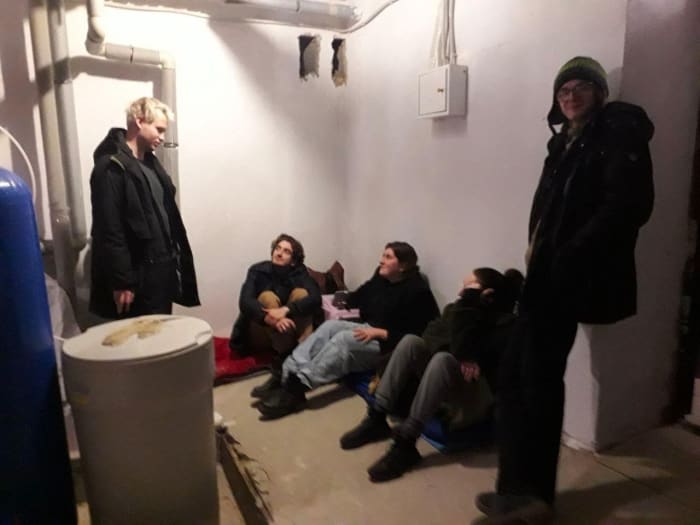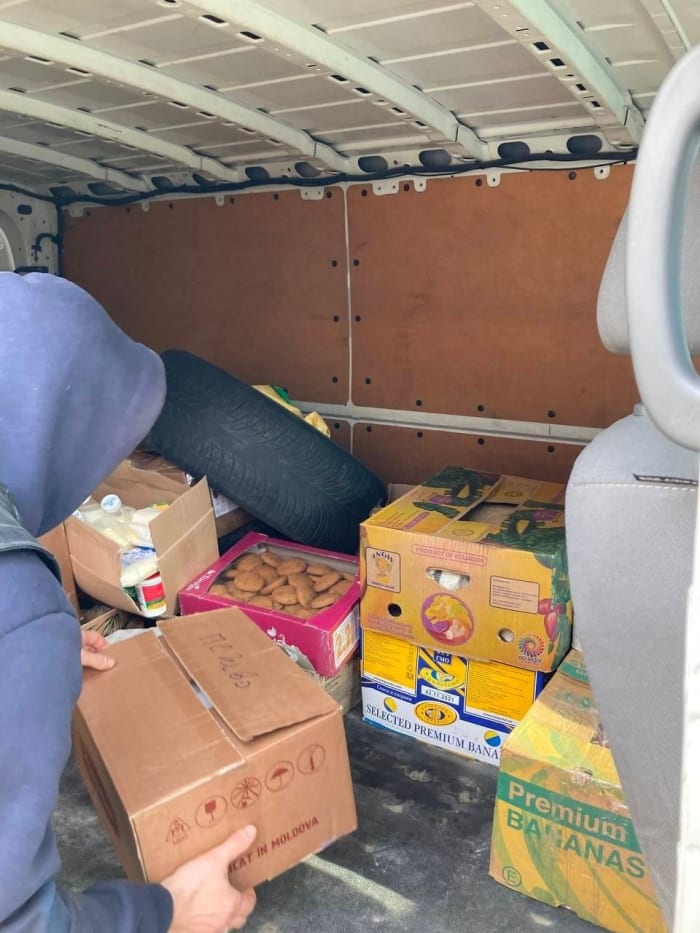Demonstrating its unique utility on the biggest world stage of the moment, Bitcoin has helped Ukrainian armed forces and nongovernmental organizations raise money from overseas supporters to fight back against Russian invasion that began in late February amid rising tensions between the two countries as Ukraine sought to forge closer ties with the European Union and NATO.
But military help isn’t all that Bitcoin has facilitated for the Ukrainian people. The peer-to-peer (P2P) currency is also enabling a prolific Bitcoin developer to receive international, pseudonymous donations to meet local demand for funding and humanitarian aid as Russian troops advance to attack new cities.
“I try to focus on fulfilling small funding requests from a small network of volunteers on the spot in Kyiv and other cities,” Gleb, a Bitcoin developer originally from Kharkiv, Ukraine, told Bitcoin Magazine. “Unfortunately, this doesn’t work for Kharkiv because logistics is messed up, and money is almost useless there. So, we have to load our trucks or train cabins by ourselves here, and send them that way manually.”
Gleb and his team packed a van with food, clothes and medical supplies to aid children in Kharkiv. The supplies reached their destination in one day, Gleb said, after their driver loaded up a train cabin headed to the city. Image courtesy of Gleb.
A Sovereign Battle
While Russian President Vladimir Putin tries to suggest that Russians and Ukrainians are one people, rather than two separate nations, in a bid to legitimize his invasion, Ukrainians are standing their ground and tapping their sovereignty.
“The Soviet Union tried hard to promote this narrative, for example by banning Ukrainian language and forcing deportations of entire Ukrainian villages and replacing them with Russians,” Gleb said of the conflict at large. “Pointing [to] our similarities brings only negative emotions to Ukrainian people, because they were often forced on us to replace the unique things, and currently Putin takes the same strategy.”
Gleb has been a Bitcoin Core contributor since 2018, having given several talks about Bitcoin and Bitcoin development over the years. More recently, he co-authored the CoinPool white paper, describing a Bitcoin scaling proposal that enables users to permissionlessly conduct off-chain payments while sharing the same UTXO. The paper was released days before the outset of the Russian-Ukrainian war.
Gleb began his Bitcoin journey years ago as he worked on building Ukraine’s largest cryptocurrency exchange, Kuna. The developer seized the opportunity to dive deeper into protocol-level Bitcoin development later on, during a master’s program at the University of British Columbia in Vancouver. Gleb’s foray into the west led him to work with Bitcoin companies Blockstream and Chaincode and to move to New York.
“When COVID started, I had to move back to Ukraine due to paperwork, but I always thought it was temporary,” Gleb said. “When the paperwork issues were over, I realized I want to stay in Ukraine because it’s home and I love it here: the people, freedom, rapid development of everything.”
However, Ukraine’s growth hit pause when the country was invaded, leading many to shift focus into helping their neighbors in any way they can. For Gleb, this meant leveraging his Bitcoin expertise to facilitate receiving donations internationally and conducting trade locally.
“Bitcoin was a great tool to fundraise, first of all. I just can’t imagine doing this via fiat,” Gleb said. “Second, it’s very liquid here, so a great tool to get USD or EUR or UAH [Ukrainian hryvnia] for local missions as well. For some missions, I pay in bitcoin straight up. For example, we bought two used vans in Poland with bitcoin. The cars are then used by my trusted drivers to deliver stuff to the warzone and evacuate people.”
The developer is tasked with doing a little bit of everything, including managing the received funding, coordinating internal and external volunteers and working closely with his team members to deliver the necessary support wherever it is needed most. But Gleb doesn’t work alone; his team is composed of one person getting inbound requests and managing logistics, two drivers and four on-the-spot volunteers located in Kyiv and Kharkiv.

Gleb (left, standing) and part of his team find cover in a bomb shelter underground after Ukrainian forces detected a hostile rocket or aircraft flying in their direction. Image courtesy of Gleb.
Using Bitcoin On The Ground In Ukraine
“We closely cooperate with two other groups: one group of highly-creative startup people streamlining logistics across the border, and a group of close Bitcoin-minded friends focused on sourcing stuff from abroad,” Gleb said.
The Bitcoin developer explained that, while some suppliers will accept bitcoin, others prefer fiat. To fill in the gap, the group has relied on a Telegram bot previously used in times of peace to sell bitcoin for debit card fiat once a month.
“Now, their team provides me with their agent on the spot. He manages all deals in a P2P way,” Gleb said. “I needed $2k cash to buy a car. I went to the agent’s place, and another guy came with USD cash. The deal happened right there.”
The car was purchased to send $20,000 worth of medical supplies and $10,000 worth of food and children supplies to Kyiv, Gleb said.
The setup is more reliable and efficient than banks, he added, as the traditional system can sometimes take a couple of hours because of issues on his agent’s side. Moreover, while his agent charges a 1% fee to convert from hryvnia into U.S. dollars as needed, a similar alternative in a traditional currency exchange would charge almost 25%, he said.

Most of the work done by Gleb and his team relates to funneling the bitcoin donations received into areas that need the most support. Sometimes they will do the packaging and shipping themselves, other times they will send money directly to other volunteers in different locations who can arrange the necessary supplies in cities under attack. Image courtesy of Gleb.
“These are cargos funded by cars,” Gleb said. “For one trip from Western Ukraine to Kyiv, we bought a car, packed it with humanitarian cargo and sent our driver there. The car will remain in Kyiv for volunteering needs locally.”
In another instance, the developer funded local efforts in Kyiv and Chernihiv by sending money to his trusted volunteers on the ground, who bought and drove food to shelters where orphans were hiding.
While hundreds of thousands of Ukrainians have tried to flee the country to escape the war, Gleb chose to stay and help empower on-the-ground efforts to supply medical and food aid to the victims of the Russian invasion. He was in Kyiv when the first bombings began, and drove to West Ukraine as he thought Russia would move at quick strides and eventually seize the capital.
“My friends then drove to the border to leave the country, but I decided to stay,” he said. “I felt I could be useful here, in one way or another. So I just relocated to a place where I can be more useful, where I don’t have to spend hours in shelters: a small town in Western Ukraine.”
As for next steps, Gleb said that it is hard to plan at the moment as he struggles to overcome the “denial phase” — as he put it — in which he wishes things could get resolved in a week. However, the team has agreed on a “backup plan” to move to the countryside, in a safer part of Ukraine, if the war doesn’t begin to wind down soon. Gleb explained that their plan B is to purchase a house with personal funds “and learn to live there.”
Amid the rising conflict and daily humanitarian efforts on the ground, Gleb has found some time to develop a step-by-step guide for Russians interested in anonymously donating bitcoin to Ukrainian efforts. The group’s main donations page is also live, running on a BTCPay Server instance that automatically generates a new address for each donation. As of March 9, the group has raised 3.1 BTC, which has all been spent on its humanitarian aid efforts.
“While hoping this will end on a rather positive note soon, we are ready to continue our mission if we manage to fundraise more bitcoin,” Gleb said.
Credit: Source link






















 Bitcoin
Bitcoin  Ethereum
Ethereum  XRP
XRP  Tether
Tether  Solana
Solana  USDC
USDC  Dogecoin
Dogecoin  Cardano
Cardano  Lido Staked Ether
Lido Staked Ether  TRON
TRON  Wrapped Bitcoin
Wrapped Bitcoin  Wrapped stETH
Wrapped stETH  Chainlink
Chainlink  Avalanche
Avalanche  Sui
Sui  Stellar
Stellar  Litecoin
Litecoin  Shiba Inu
Shiba Inu  Toncoin
Toncoin  Hedera
Hedera  LEO Token
LEO Token  USDS
USDS  Hyperliquid
Hyperliquid  Polkadot
Polkadot  WETH
WETH  MANTRA
MANTRA  Bitcoin Cash
Bitcoin Cash  Ethena USDe
Ethena USDe  Bitget Token
Bitget Token  Wrapped eETH
Wrapped eETH  Uniswap
Uniswap  Monero
Monero  NEAR Protocol
NEAR Protocol  Pepe
Pepe  WhiteBIT Coin
WhiteBIT Coin  Aave
Aave  Ondo
Ondo  Bittensor
Bittensor  Aptos
Aptos  Internet Computer
Internet Computer  Dai
Dai  Official Trump
Official Trump  Ethereum Classic
Ethereum Classic  Mantle
Mantle  Tokenize Xchange
Tokenize Xchange  OKB
OKB  Gate
Gate  sUSDS
sUSDS  Coinbase Wrapped BTC
Coinbase Wrapped BTC 
